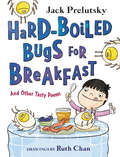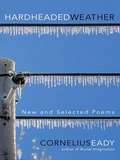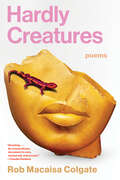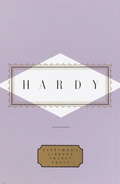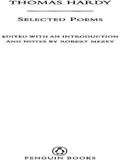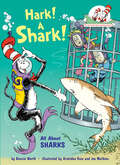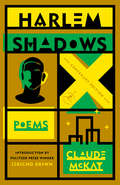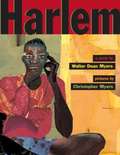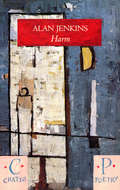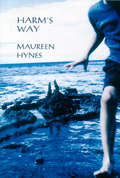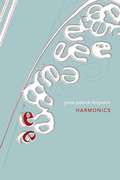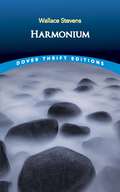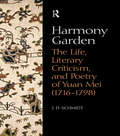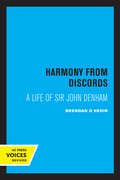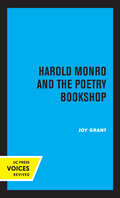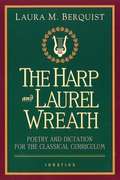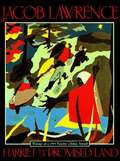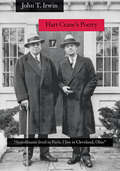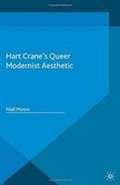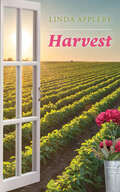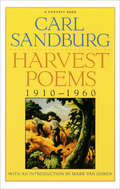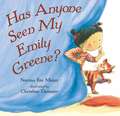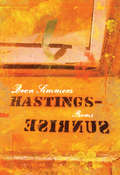- Table View
- List View
Hard-Boiled Bugs for Breakfast: And Other Tasty Poems
by Jack PrelutskyA new collection from the celebrated first Young People’s Poet Laureate and bestselling poet Jack Prelutsky, featuring more than one hundred original poems! Hard-Boiled Bugs for Breakfast is guaranteed to make readers laugh, imagine, write, and dream. From a lizard playing a mandolin (although not very well) to the surprised guest of honor (at a birthday party he threw for himself), there’s something for everyone in Jack Prelutsky’s Hard-Boiled Bugs for Breakfast. Illustrator Ruth Chan’s lively and hilarious black-and-white art jumps off the page and illuminates a wide array of poetic forms, from haiku to concrete poems and everything in between.This collection is full of the wit, humor, and imagination that has made Jack Prelutsky a household name and one of the most beloved poets for children. His poetry books for kids include such favorites as A Pizza the Size of the Sun and The New Kid on the Block. Includes black-and-white line art on every page, plus an index.
Hardheaded Weather
by Cornelius EadyCornelius Eady's new poems show him in full control of his considerable talents and displaying a rich maturity as he enters midlife. His poems are sly, unsentimental, and witty, full of truths that are intimate and profound. Hardheaded Weatherranges widely, reflecting the newfound responsibilities Eady has assumed as he transitions from urban renter to nonplussed rural homeowner, as well as the sobering influence of war and the intimation of his own mortality. Yet even at his angriest, the poet has always had a depth of compassion rare in our polarized age, with a sense of humor that is both sophisticated and demotic. These poems will resonate deeply. As exciting as the new poems are, his selected earlier poems dazzle, too, as they demonstrate the arc of Cornelius Eady's maturation and the originality of his voice. Taken together, Hardheaded Weatherforms a moving-and sometimes searing -testament to the power of poetry.
Hardheaded Weather
by Cornelius EadyCornelius Eady's new poems show him in full control of his considerable talents and displaying a rich maturity as he enters midlife. His poems are sly, unsentimental, and witty, full of truths that are intimate and profound. Hardheaded Weather ranges widely, reflecting the newfound responsibilities Eady has assumed as he transitions from urban renter to nonplussed rural homeowner, as well as the sobering influence of war and the intimation of his own mortality. Yet even at his angriest, the poet has always had a depth of compassion rare in our polarized age, with a sense of humor that is both sophisticated and demotic. These poems will resonate deeply. As exciting as the new poems are, his selected earlier poems dazzle, too, as they demonstrate the arc of Cornelius Eady's maturation and the originality of his voice. Taken together, Hardheaded Weather forms a moving--and sometimes searing --testament to the power of poetry.
Hardly Creatures: Poems
by Rob Macaisa Colgate"Dazzling. . . . An extraordinary document in care, mutual aid, and access."—Claudia Rankine An imaginative and unforgettable debut poetry collection about the joys and complexities of the disability community from 2024 Ruth Lilly fellow Rob Macaisa Colgate. Brilliant and innovative, Rob Macaisa Colgate’s debut poetry collection, Hardly Creatures, takes the form—visually and metaphorically—of an accessible art museum. Through nine sections that act as gallery rooms, the book shepherds the reader through the radiance and mess of the disability community. At the heart of the collection is an exploration and recognition of access intimacy. Marked with universal access symbols to guide the way, poems mimic sensory rooms, tactile replicas, benches for resting, and more; “the body of a poem” itself is reimagined through formal experimentation, as abecedarians are scrambled out of order and sestinas are pressurized into new sequences. These poems also play with pop culture allusions, social media posts, and the infinite possibilities within queer love and deep friendships. With lyrical clarity and attention to language, Hardly Creatures reaches out and offers inventive, heartfelt insights for all readers, and celebrates the disability community through the lens of a visionary new voice in poetry.
Hardy: Poems
by Thomas HardyThe Everyman's Library Pocket Poets hardcover series is popular for its compact size and reasonable price which does not compromise content. Poems: Hardy contains poems from Moments of Vision, Satires of Circumstance, Veteris Vestigia Flammae, Heredity, Short Stories, Afterwards, and an index of first lines.
Hardy: Selected Poems
by Thomas Hardy Robert MezeyHardy abandoned the novel at the turn of the century, probably after public reaction to Jude the Obscure, but continued to write verse displaying a wide variety of metrical styles and stanza forms and a broad scope of tone and attitude. This definitive volume contains selections from his numerous collections published between 1898 and 1928.
Hark! A Shark! All About Sharks: All About Sharks (The Cat in the Hat's Learning Library)
by Bonnie WorthLaugh and learn with fun facts about sharks from the smallest (the dwarf lantern) to the largest (the whale shark), the most notorious (the great white) to the most obscure (the goblin), and more—all told in Dr. Seuss&’s beloved rhyming style and starring The Cat in the Hat! &“In a super shark tank that is like a small sea, we will visit with sharks. Do you dare come with me?&” The Cat in the Hat&’s Learning Library series combines beloved characters, engaging rhymes, and Seussian illustrations to introduce children to non-fiction topics from the real world! Dive deep into the world of sharks and discover: • why they have lots of teeth but no bones• how their tough skin helps them swim fast and stay clean• how they come in all shapes and sizes• and much more! Perfect for story time and for the youngest readers, Hark! A Shark! also includes an index, glossary, and suggestions for further learning. Look for more books in the Cat in the Hat&’s Learning Library series!Cows Can Moo! Can You? All About FarmsIf I Ran the Dog Show: All About DogsOh Say Can You Say Di-no-saur? All About DinosaursOn Beyond Bugs! All About InsectsOne Vote Two Votes I Vote You VoteThere&’s No Place Like Space: All About Our Solar SystemWho Hatches the Egg? All About EggsWhy Oh Why Are Deserts Dry? All About DesertsWish for a Fish: All About Sea Creatures
Harlem Shadows: Poems
by Claude McKayA harbinger of the Harlem Renaissance first published in 1922, this collection of poignant, lyrical poems explores Claude McKay&’s yearning for his Jamaican homeland and the bitter plight of Black and African Caribbean people in America—now with an introduction by Pulitzer Prize–winning poet Jericho Brown. ONE OF THE MOST ANTICIPATED BOOKS OF 2022—VultureWith pure heart, passion, and honesty, Claude McKay offers an acute reflection on the complex nature of racial identity in the Caribbean diaspora, encompassing issues such as nationalism, freedom of expression, class, gender, and sex. The collection&’s eponymous poem, &“Harlem Shadows,&” portrays the struggle of sex workers in 1920s Harlem. In &“If We Must Die,&” McKay calls for justice and retribution for Black people in the face of racist abuse. Juxtaposing the cacophony of New York City with the serene beauty of Jamaica, McKay urges us to reckon with the oppression that plagues a &“long-suffering race,&” who he argues has no home in a white man&’s world. Poems of Blackness, queerness, desire, performance, and love are infused with a radical message of resistance in this sonorous cry for universal human rights. Simultaneously a love letter to the spirit of New York City and an indictment of its harsh cruelty, Harlem Shadows is a stunning collection that remains all too relevant one hundred years after its original publication.
Harlem: A Poem
by Walter Dean MyersA poem calling to life the deep, rich and hope-filled history of the Harlem community. Connects readers to the spirit of Harlem in its music, art, literature, and everyday life.
Harlem: Poems In Many Voices (Horrible Histories Special Ser.)
by Walter Dean Myers Christopher MyersNIMAC-sourced textbook
Harm
by Alan JenkinsThe poems in this, Alan Jenkin's third collection, speak of the harm done and suffered - most frequently in the name of love - in the course of lives gone adrift among lost causes, chance meetings and missed chances. A new directness and simplicity, and throughout, a raw urgency of personal feeling, inform a voice that is as resourceful as in Jenkin's earlier volumes, and continues to salvage a 'fugitive lyricism' (as one reviewer put it) from harsh and dissonant realities. 'By turns jocular, disquieting, sexy and inventive'-PETER READING, SUNDAY TIMES 'Jenkins' poetry is exhilarating. . . It is charged with erotic energy, rage, sorrow and confusion'-TLS 'Stylish, Savage, unforgiving'-HUGO WILLIAMS, SUNDAY TELEGRAPH 'Jenkins has a restless mind: following his poetry gives his readers a rocky ride, but also a rewarding one. '-PETER PORTER, OBSERVER.
Harm's Way
by Maureen HynesWater, wood, metal, stone, salt, cotton -- these are some of the everyday talismans that Maureen Hynes encounters on her journey through Harm's Way. A soldier's gold fountain pen, like the war itself, lies buried for decades; the corrugated metal and glass shattered across the Australian outback teach her a new way to look at landscape; the silk of an old parachute recalls her first lesson in longing, and even the ribbed cotton of new undershirts sparks a poignant grief. In this, her remarkably deft second collection of poems, Hynes takes us travelling on a road signposted with the dangers and fears we encounter in the larger world and which intersects with our most private moments and memories. But Harm's Way is also a shared journey fueled by a meticulous search for hope, compassion and courage, for "the molecular level of kindness." The intensity of our personal engagement with the world and with others, suggests Hynes, both heightens the journey's menace and redeems its pain.
Harmonics
by Jesse Patrick FergusonJesse Patrick Ferguson brings music and poetry into conversation with each other in this compelling debut collection. Modelled on the fundamental tones and overtones of the harmonic series, poems in Ferguson’s arrangement riff on one another, and words, phrases and images resonate sympathetically, with all the energy and buzz of a firmly plucked mandolin string. Throughout, Ferguson pays homage to poetic traditions, infusing age-old forms like the sonnet and the villanelle with an astute and contemporary political sensibility, a unique and fresh aesthetic energy, and a breezy, brazen East Coast swagger. In dense and vivacious verse, he tunefully explicates a range of subjects from climate change to rent cheques to various incarnations of love, offering the reader a tin-can telephone to the raucous and beautiful symphony of everyday life.
Harmonium: Facsimile Of 1923 Edition (Dover Thrift Editions: Poetry)
by Wallace Stevens"There are in Harmonium six or eight of the most beautiful poems an American has written. The poems see, feel, and think with equal success." — Randall Jarrell, Poetry and The Age An executive with a Connecticut-based insurance company, Wallace Stevens (1879–1955) wrote poetry in the evenings and during his daily commute. Harmonium, his first collection of verse, was published when he was 44 years old. Although largely overlooked upon its 1923 debut, the compilation is recognized today as an important contribution to Modernism, offering a diverse range of satirical and philosophical lyrical works that explore the nature of reality and the power of the imagination. They include some of Stevens's most famous and frequently studied works, including "Thirteen Ways of Looking at a Blackbird," "The Emperor of Ice-Cream," and "Peter Quince at the Clavier."
Harmony Garden: The Life, Literary Criticism, and Poetry of Yuan Mei (1716-1798)
by J. D. SchmidtThis is the first complete study of China's most popular eighteenth-century poet in any Western language. The work consists of a detailed biography, a study of Yuan's revolutionary reinterpretation of Chinese literary theory, and an analysis of his many contributions to the more original genres of Qing-dynasty (1644-1911) poetry such as narrative, historical, didactic, eccentric, and nature verse. The study is concluded by a generous and representative sampling of Yuan's poetry in translation, the first to do justice to the wide variety and richness of his oeuvre. Although many shorter poems are selected, this is the first translation to include his outstanding longer poetry. Harmony Garden will completely revise current attitudes in the west concerning classical Chines literature during the eighteenth century, a period that was long viewed as one of decline, but now appears to equal the golden ages of antiquity.
Harmony from Discords: A Life of Sir John Denham
by Brendan O HehirThis title is part of UC Press's Voices Revived program, which commemorates University of California Press’s mission to seek out and cultivate the brightest minds and give them voice, reach, and impact. Drawing on a backlist dating to 1893, Voices Revived makes high-quality, peer-reviewed scholarship accessible once again using print-on-demand technology. This title was originally published in 1968.
Harold Monro and the Poetry Bookshop
by Joy GrantThis title is part of UC Press's Voices Revived program, which commemorates University of California Press’s mission to seek out and cultivate the brightest minds and give them voice, reach, and impact. Drawing on a backlist dating to 1893, Voices Revived makes high-quality, peer-reviewed scholarship accessible once again using print-on-demand technology. This title was originally published in 1967.
Harp And Laurel Wreath: Poetry And Dictation For The Classical Curriculum
by Laura BerquistConvinced that a critical part of education is to foster in our children a love of the beautiful and true, teacher and writer Laura Berquist presents this wide selection of poetry for every age level from grades one to twelve. Language development is significantly enriched by exposure to good poetry. This book is an important resource because it provides in one volume many poems that concern noble actions or ideas presented in beautiful patterns of sound. <p><p> This book contains all the poems recommended in Berquist's best-selling Designing Your Classical Curriculum. The extensive selection includes poems by Robert Louis Stevenson, Henry Wadsworth Longfellow, Robert Browning, William Shakespeare, G.K. Chesterton, William Butler Yeats, Robert Frost, and many others. There are three indices to help locate specific poems. This book also includes dictation selections that are useful tools in the development of the child's writing ability, as well as study questions and answers for each poem.
Harriet And The Promised Land
by Jacob LawrenceA brief biography in verse about Harriet Tubman and her dedicated efforts to lead her fellow slaves to freedom.
Hart Crane's Poetry: "Appollinaire lived in Paris, I live in Cleveland, Ohio"
by John T. IrwinHonorable Mention, Literature, 2012 PROSE Awards, Professional and Scholarly Publishing Division of the Association of American Publishers2012 Outstanding Academic Title, Choice MagazineIn one of his letters Hart Crane wrote, "Appollinaire lived in Paris, I live in Cleveland, Ohio," comparing—misspelling and all—the great French poet’s cosmopolitan roots to his own more modest ones in the midwestern United States. Rebelling against the notion that his work should relate to some European school of thought, Crane defiantly asserted his freedom to be himself, a true American writer. John T. Irwin, long a passionate and brilliant critic of Crane, gives readers the first major interpretation of the poet’s work in decades. Irwin aims to show that Hart Crane’s epic The Bridge is the best twentieth-century long poem in English. Irwin convincingly argues that, compared to other long poems of the century, The Bridge is the richest and most wide-ranging in its mythic and historical resonances, the most inventive in its combination of literary and visual structures, the most subtle and compelling in its psychological underpinnings. Irwin brings a wealth of new and varied scholarship to bear on his critical reading of the work—from art history to biography to classical literature to philosophy—revealing The Bridge to be the near-perfect synthesis of American myth and history that Crane intended.Irwin contends that the most successful entryway to Crane’s notoriously difficult shorter poems is through a close reading of The Bridge. Having admirably accomplished this, Irwin analyzes Crane’s poems in White Buildings and his last poem, "The Broken Tower," through the larger context of his epic, showing how Crane, in the best of these, worked out the structures and images that were fully developed in The Bridge.Thoughtful, deliberate, and extraordinarily learned, this is the most complete and careful reading of Crane’s poetry available. Hart Crane may have lived in Cleveland, Ohio, but, as Irwin masterfully shows, his poems stand among the greatest written in the English language.
Hart Crane's Queer Modernist Aesthetic
by Niall MunroHart Crane's Queer Modernist Aesthetic argues that the aspects of experience which modernists sought to interrogate - time, space, and material things - were challenged further by Crane's queer poetics. Reading Crane alongside contemporary queer theory shows how he creates an alternative form of modernism.
Harvest
by Linda ApplebyHarvest was forged in an emotional melting-pot. The author was walking one morning in the grounds of Fulbourn Psychiatric Hospital near Cambridge, having been held under a section of the Mental Health Act. This meant that she could not leave the hospital grounds. But the grounds were extensive and from the edge of the gardens she could see Fulbourn windmill standing on the brow of Fulbourn Hill. She reached deeply inside herself and came up with a poem which, though she had always written, came from a place more serious and resonant than ever before.Gradually, other poems followed, detailing her interaction with the mental health system and the consoling connection she felt with the natural world. On her release, she finished the collection: songs, sonnets, hymns and ballads, a readable variety of responses to harsh experience.
Harvest Poems: 1910–1960
by Carl SandburgThe great American poet’s essential collection spanning fifty years of verse—with an introduction by Mark Van Doren.With major contributions in the realms of journalism, biography and children’s fiction, Carl Sandburg was a luminary of twentieth-century American literature. But he was first a foremost a poet who transformed the diversity of his experience into powerfully vivid and beloved verse. His many collections won numerous accolades, including two Pulitzer Prizes.This selection of Sandburg’s poems is culled from half a century of output and includes thirteen poems appearing in book form for the first time. As this collection so masterfully demonstrates, “[Sandburg’s poetry] is independent, honest, direct, lyric, and it endures, clamorous and muted, magical as life itself” (New York Times).
Has Anyone Seen My Emily Greene?
by Norma Fox MazerThe perennial game of hide-and-seek between parent and child inspires a lilting text and charming illustrations. It's time for lunch, but where, oh, where is Emily Greene? Her father searches for her everywhere, but without any luck. Look carefully, and don't forget to check behind the curtains! In her first picture book, acclaimed author Norma Fox Mazer teams with renowned illustrator Christine Davenier to create a merry game of hide-and-seek. Readers will delight in searching for giggling Emily and in the warm relationship between this irrepressible little girl and her loving, good-humored father.
Hastings-Sunrise
by Bren SimmersHastings-Sunrise is a love letter to a fleeting place and time. Bren Simmers's second collection captures her old East Vancouver neighbourhood in the midst of upheaval. As it is colonized by tides of matching plaid and diners serving pulled-pork pancakes, condo developments replace the small businesses and cheap rentals that once gave the area its charm.Much like opening a set of nesting dolls, leafing through the collection exposes further layers of depth and intimacy. Within the context of cultural change, Simmers explores the meaning to be found in everyday things: the making of a home, the life built from daily routines. At the same time, she reveals the dissonance that can occur between personal and large-scale change: "Twitter feed of melting sea ice, / colony collapse / while we picnic under pink ribbons, / kiss again like we mean it."Throughout the collection, the poet's eye unfailingly lights on the perfect details to evoke a scene: "On Mr. Donair's spit, / the earth rotates. Papal smoke emits / from Polonia Sausage, semis shunt / downtown." Visual poems forming maps of Christmas lights and autumn colours further bring the Hastings-Sunrise neighbourhood to life, illustrating the interweaving of human and natural spaces and locating "home" in between.Like a tree clothed in multicoloured yarn or a miniature house filled with free books, Hastings-Sunrise is a gift to readers, beautiful in its simplicity.
